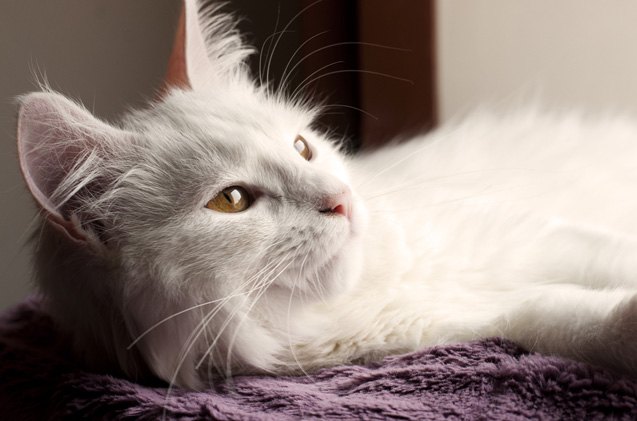
Have you ever heard of FIP in cats? This serious viral disease can affect cats of all breeds and ages – here’s what you need to know.
You’ve likely heard about FIV and FeLV, but do you know about Feline Infectious Peritonitis, also known as FIP? Check out some quick facts below so you can be more aware of this uncommon yet serious disease the can affect cats.
What Is Feline Infectious Peritonitis, and What Causes It?
Experts are still trying to understand FIP better. What they already know, though, is that Feline Infectious Peritonitis is a viral disease that’s actually caused by some strains of Feline Coronavirus (FCoV). Domestic cats of all ages and from all over the world could be affected. However, FIP most commonly develops in young kitties that are under 2 years old.
Related:What Is FIV In Cats?
There are multiple strains of FCoV, and many Feline Coronavirus strains won’t result in FIP. Also, kitties that are infected with FCoV may not even exhibit any symptoms; however, the cats develop an immune response and antibodies.
Unfortunately, anywhere from 5-10% of cats that are infected with FCoV develop clinical FIP. This could occur because the virus mutates or there’s an abnormal immune response. FIP spreads throughout the kitty’s body, and a severe inflammatory reaction develops, oftentimes within the brain, kidneys, or abdomen. At this point, the disease is progressive and almost always fatal.
What’s worse, lab tests aren’t able to distinguish between strains of FCoV that could cause FIP and those that won’t lead to serious disease. Experts aren’t even totally clear on which factors would cause one kitty to become infected with FIP while another remains unaffected. They believe that genetics and re-infection might play a role in FIP developing.
Which Cats Are Most at Risk of FIP?
Basically, any kitty that has been infected with a strain of FCoV might be at risk of it mutating into FIP. But pets that have a weak immune system might be more susceptible. That includes geriatric cats, kittens, and those infected with Feline Leukemia (FeLV).
Related:What Is Feline Leukemia?
Feline Coronavirus is found in large amounts in the feces and saliva of an infected cat during acute infection. It’s also found, to a lesser extent, in kitties that have recovered from the virus and those who are carriers. This means that FCoV could be transferred from one cat to another through direct contact and through exposure to feces. Also, FCoV could be transmitted to kittens by infected mother cats, and this usually occurs when the kittens are 5 to 8 weeks old.
FIP itself isn’t considered highly contagious because only small amounts of the virus are shed once a kitty develops clinical disease. And even though it’s considered relatively uncommon within the general population, this disease is more common in shelters, catteries, and other multi-cat environments.
What Are the Symptoms and Treatments of FIP?
When a cat is exposed to FCoV, she might not exhibit any obvious signs of infection. However, some kitties might end up with mild upper respiratory symptoms that could include nasal discharge, sneezing, and watery eyes. And some cats might end up having mild intestinal problems like diarrhea.
It could take weeks, months, or years for FIP to develop, and in cats that are infected, symptoms might appear suddenly (especially because cats could hide initial signs of illness). Once the symptoms occur, they could continue becoming more severe over several weeks until the pet dies.
To make FIP even more complicated for vets and pet owners, there are actually two major forms, known as the wet form and the dry form. And a vet might have difficulty diagnosing the disease because every kitty might have different symptoms that are similar to those of other ailments.
In terms of treatment, there aren’t yet any cures, but some options might allow for short-term remission in some cats. Because FIP is fatal, supportive care is all that’s possible. Research into effective treatments is ongoing.
How Is a Cat Diagnosed with FIP?
There isn’t yet any straightforward diagnostic test for FIP. There are tests that could detect FCoV antibodies, but a vet won’t be able to determine if a cat has a strain that could lead to FIP. In other words, a test that comes up positive for Coronavirus antibodies only means that the animal was exposed to the virus, but there’s no way to know if the strain she was infected with will cause FIP.
Experts haven’t come up with a way to screen cats for FIP risk while they’re healthy either. Examining the fluid, symptoms, and history of a cat could help a vet make a diagnosis, but to definitively diagnose a cat with FIP, a biopsy would be needed.
A Scary Feline Disease to Be Aware Of
FIP is challenging and especially scary because many cases result in death. If you have any questions regarding FIP and your cat’s risk, be sure to consult with your vet.














